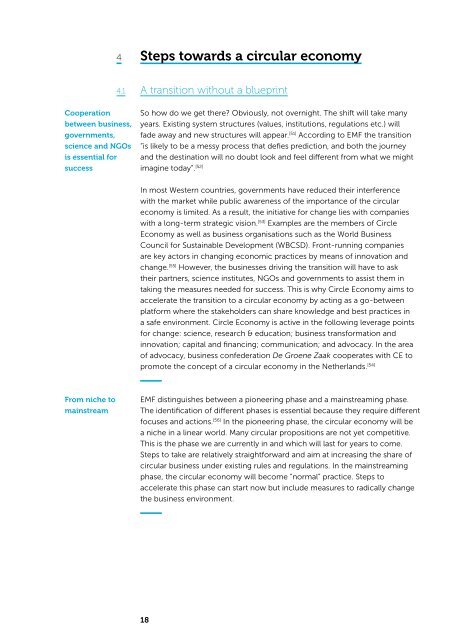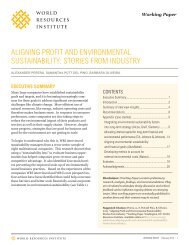Unleashing the Power of the Circular Economy
Unleashing the Power of the Circular Economy
Unleashing the Power of the Circular Economy
Create successful ePaper yourself
Turn your PDF publications into a flip-book with our unique Google optimized e-Paper software.
From niche to<br />
mainstream<br />
4<br />
4.1<br />
Cooperation<br />
between business,<br />
governments,<br />
science and NGOs<br />
is essential for<br />
success<br />
Steps towards a circular economy<br />
A transition without a blueprint<br />
So how do we get <strong>the</strong>re? Obviously, not overnight. The shift will take many<br />
years. Existing system structures (values, institutions, regulations etc.) will<br />
fade away and new structures will appear. [51] According to EMF <strong>the</strong> transition<br />
“is likely to be a messy process that defies prediction, and both <strong>the</strong> journey<br />
and <strong>the</strong> destination will no doubt look and feel different from what we might<br />
imagine today”. [52]<br />
In most Western countries, governments have reduced <strong>the</strong>ir interference<br />
with <strong>the</strong> market while public awareness <strong>of</strong> <strong>the</strong> importance <strong>of</strong> <strong>the</strong> circular<br />
economy is limited. As a result, <strong>the</strong> initiative for change lies with companies<br />
with a long-term strategic vision. [53] Examples are <strong>the</strong> members <strong>of</strong> Circle<br />
<strong>Economy</strong> as well as business organisations such as <strong>the</strong> World Business<br />
Council for Sustainable Development (WBCSD). Front-running companies<br />
are key actors in changing economic practices by means <strong>of</strong> innovation and<br />
change. [55] However, <strong>the</strong> businesses driving <strong>the</strong> transition will have to ask<br />
<strong>the</strong>ir partners, science institutes, NGOs and governments to assist <strong>the</strong>m in<br />
taking <strong>the</strong> measures needed for success. This is why Circle <strong>Economy</strong> aims to<br />
accelerate <strong>the</strong> transition to a circular economy by acting as a go-between<br />
platform where <strong>the</strong> stakeholders can share knowledge and best practices in<br />
a safe environment. Circle <strong>Economy</strong> is active in <strong>the</strong> following leverage points<br />
for change: science, research & education; business transformation and<br />
innovation; capital and financing; communication; and advocacy. In <strong>the</strong> area<br />
<strong>of</strong> advocacy, business confederation De Groene Zaak cooperates with CE to<br />
promote <strong>the</strong> concept <strong>of</strong> a circular economy in <strong>the</strong> Ne<strong>the</strong>rlands. [54]<br />
EMF distinguishes between a pioneering phase and a mainstreaming phase.<br />
The identification <strong>of</strong> different phases is essential because <strong>the</strong>y require different<br />
focuses and actions. [56] In <strong>the</strong> pioneering phase, <strong>the</strong> circular economy will be<br />
a niche in a linear world. Many circular propositions are not yet competitive.<br />
This is <strong>the</strong> phase we are currently in and which will last for years to come.<br />
Steps to take are relatively straightforward and aim at increasing <strong>the</strong> share <strong>of</strong><br />
circular business under existing rules and regulations. In <strong>the</strong> mainstreaming<br />
phase, <strong>the</strong> circular economy will become “normal” practice. Steps to<br />
accelerate this phase can start now but include measures to radically change<br />
<strong>the</strong> business environment.<br />
18



